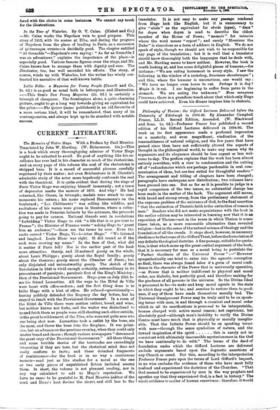CURRENT LITERATURE.
The Memoirs of Victor Hugo. With a Preface by Paul Meurice. Translated by John W. Harding. (W. Heinemann. 10s.)—This is a book which every thoroughgoing admirer of Victor Hugo ought to be exhorted to avoid. No poet of anything like his ex- cellence has ever had in his character so much of the rhetorician, and on every page of this volume the soul of the rhetorician is stripped bare. It is a record of successful phrases carefully registered by their maker ; not even Brichanteau in M. Claretie's admirable study of the actor more hopelessly confounds the real with the theatrical. It is quite evident that during the siege of Paris Victor Hugo was enjoying himself immensely ; not a trace of depression marks the memoir of 1870. And why ? He had returned, like Cicero, in triumph ; medals were struck to com- memorate his return ; his name replaced Haussmann's on the boulevard ; " Les Chfitiments " was selling like wildfire, and recitations of his verses were given in theatres, where a collec- tion was made in Prussian helmets by the actresses, the proceeds going to pay for cannon. National Guards sent in resolutions " forbidding " Victor Hugo to risk " a life that is so previous to France "; the Minister of Finance wrote " asking Hugo to ' grant him an audience,' "—these are the terms he uses. Even the cocks crowed " Victor Hugo, Vi—i—ictor Hugo." "We listened and laughed. Louis Blanc was right. It did sound as if the cock were crowing my name." In the face of that, what did it matter if Paris fell ? Nor is the earlier part of the book more attractive. Gossip, and ill-natured gossip on the whole, about Louis Philippe ; gossip about the Royal family ; gossip about the theatres ; gossip about the Chamber of Peers ; but only disjointed and untrustworthy gossip. The sketch of the Revolution in 1848 is vivid enough certainly, extraordinary in its presentment of paralysis ; paralysis first of the King's Ministry ; then of the Provisional Government. Hugo goes on July 25th to see his friend Lamartine. All the ways to the Hotel de Ville were beset with office-seekers ; and the first thing done is to bribe Hugo with a hint of office. He refused—provisionally — having publicly defended the Regency the day before, but he stayed to lunch with the Provisional Government. In a room of the HOtel de Ville there were mutton cutlets, bread, and wine, but neither knives nor forks, and the waiter was disinclined to go and fetch them as people were still shooting each other outside, to the great bewilderment of the Five, who were not quite sure who was being shot now. Lamartine took a cutlet by the bone, ate he meat, and threw the bone into the fireplace. It was primi- tive, but an advance on the previous evening, when they could only muster bread and cheese ; though various newspapers " denounced the great orgy of the Provisional Government." All these things end some terrible stories of the barricades are exceedingly interesting if they are true, but the rhetorical mind does not easily conform to facts ; and these detached fragments sf reminiscence—for the book is in no way a continuous memoir—read just as like studies for a novel as the one or two early pieces of unpublished fiction included among them. In short, the volume is not pleasant reading, nor in any way calculated to add to Hugo's reputation. We have no cause to be grateful to M. Paul Meurice (editor of the work and Hueo's host during: the siezel. and still less to the translator. It is not easy to make any passage rendered from Hugo look like English, but it is unnecessary to give " absis" as the equivalent for abside (apse), "dean" for doyen when doyen is used to describe the oldest member of the House of Peers; " memoir " for ?air/wire where the word means " report"; and surely "Monsieur the Duke" is riniculous as a term of address in English. We do not speak of style, though we should not wish to be responsible for any page of the translation; but it is well that a translator should know thoroughly both the languages that he deals with, and Mr. Harding seems to know neither. However, the book is worth looking at, and has some delightful pieces of humour,—for instance : " We are eating horsemeat in every style. I saw the following in the window of a cookshop, Saucisson chevaleresque"; and this, where the humour is unconscious, one would say : We have no longer even horse to eat. Perhaps it is dog ? Maybe it is rat. I am beginning to suffer from pains in the stomach. We are eating the unknown." Nous mangeons l'inconnu; there is a grandiose touch about that which only Hugo could have achieved. Even his dinner inspires him to rhetoric.






















































 Previous page
Previous page